Pablo Eguzkiza: the lord of terroir
Interview with the co-founder and winemaker of Compañía de Vinos Telmo Rodríguez.

The first to speak of this muse of wine were the French. Terroir is the cornerstone of the French wine philosophy and the basis of their appellation system. Used well, it can serve to define wine-producing regions and even mark out small areas of just a few hectares. There are great examples of this, such as the crus of Bordeaux or the tiny clos of Burgundy, based on very specific and detailed particularities. This term, which tries to cluster the most important aspects that give identity to a certain place, has been adopted by the world's best producers, who have endeavoured to translate their reading of the vineyard into wine, making palpable a concept that, apparently, could only be seen on paper.
The current system of appellations of origin participates in a similar sense, although most of the geographical delimitations in Spain have always been made with a much broader and more generalist perspective, whether for producers' interests, for political reasons or for historical reasons, but unfortunately rarely for influences of soils and climates, and ignoring political boundaries.
The concept of terroir brings together many factors, the vast majority of which are linked to nature and its understanding and respect. Climate and soils are elements that correspond to a specific place and are beyond human control, at least total control. It would be something like the fingerprint of a given plot of land. The best possible expression of a terroir requires a series of specific practices in the vineyard, usually not easily mechanised and oriented towards quality.
This relationship between the environment and the way winegrowers and winemakers work to ensure that everything is as pure as possible in the wine is what we know as terroir; characteristics linked to the environment that are capable of being noticeable in the wine thanks to a correct interpretation by man.
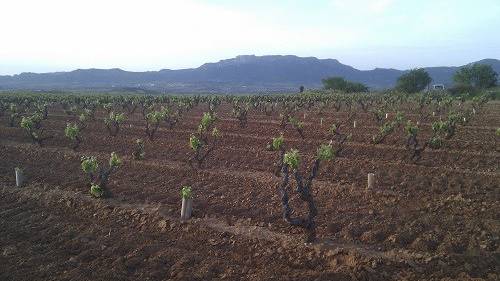
There are places that, due to their origin, given the nature of their soil and climate, produce finer wines than others, more structured or more balanced, wines in which it is easier to reach a high level of complexity. We have in mind some of Jerez's most famous pagos such as the powerful Macharnudo or the subtlety and elegance of Balbaína, to name but two examples that are currently on the lips of many wine lovers. And as there are terroirs that are better than others, there are people obsessed with the search for these specific sites, who seek to vinify them separately in order to bottle a certain place.
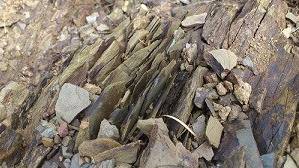
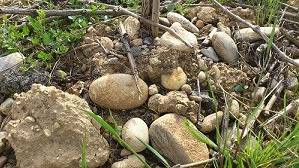
On the left, a slate soil, on the right, a gravel soil.
Among the elements that make up a given terroir are the soils, one of the main agents in its definition. In Spain we have excellent terroir-enhancing agents. The most significant are slate soils (Priorat, Arribes, Ribeira Sacra, Güimar, Calatayud or Bierzo,...), stony soils (the best estates of Toro, some areas of Ribera de Navarra, areas near the Duero in Rueda, certain places in the Rioja Oriental or some estates in Tarragona,...), clay-localcareous soils with a predominance of limestone (Rioja Alavesa and nearby areas such as Sonsierra, Rioja Alta, the Valladolid area of Ribera del Duero, some parts of Calatayud, Jumilla, Yecla, Jerez, Montilla-Moriles, Terra Alta, Alicante, Cigales, Costers del Segre, Somontano.... ), granitic soils (Rías Baixas, Valdeorras, Ribeiro, some parts of Ribeira Sacra or Cebreros, Méntrida and Vinos de Madrid), or the volcanic soils of the Canary Islands. Each of these soils influences the definition of terroir, as they have the capacity to provide a differentiating touch in this complex world of wine.
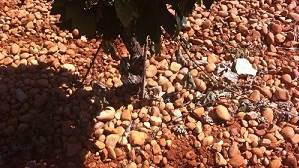
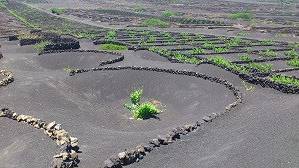
On the left, an example of ferric pebble soil. On the right, volcanic soil in Lanzarote.
Soil is only one agent in the definition of terroir, important yes, but just one more. There are other very important factors, such as the prevailing climate, the exposure of the vineyard, the varieties... everything adds up when it comes to drawing up the picture of a particular terroir. The varieties have a certain growth cycle and certain properties, which give them a specific reading if they grow in the right place for them. The different families of grapes that exist achieve a major expression in certain places. If you are curious about the world of varietal aromas, we invite you to take a look at the article What do grapes smell like?
At the end of the 20th century Spain witnessed a kind of revolution in this sense, many important production areas began to carry out ambitious studies of soils and climates in their producing regions, in order to see the possible differences in the vineyard that in the future could be translated into structures, styles or even quality levels, as is the case with the vineyard of our neighbours.
These studies, expensive and time-consuming to carry out, have been completed and, in many cases, they are now dozing in the office drawer waiting for someone to dare to put them into practice. It is true that the results obtained in some of these studies are uncomfortable to apply, as they affect some producers positively and others negatively. However, and this is a personal assessment, the benefit to the whole producing region is greater than the possible negative repercussions for certain producers, as by qualifying the brand of a region you obtain greater transparency of what an area is capable of giving.
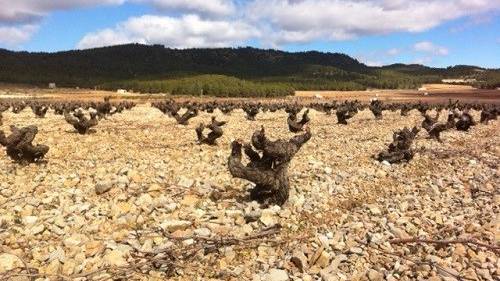
There are areas that have bravely applied the segmentation and classification of their areas by quality levels, the first two to do so in great detail being Bierzo and Priorat. Elsewhere, the division has been in place for some time, although the regulations are not as specific as they should be in order to give greater protection to these specific pagos. We also have producing regions that, even though they talk about sub-zones, do not go as far as differentiating soils, climates and specific peculiarities. The good thing about all this is that there are still paths to explore, benefits to exploit in favour of differentiation.
Terroir is, as you can see, the manna that everyone wants to feed on but for which not everyone wants to pay the price it demands.
Interview with the co-founder and winemaker of Compañía de Vinos Telmo Rodríguez.